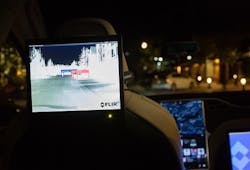FLIR launches open-source thermal imaging dataset for autonomous vehicle development
FLIR Systems (Wilsonville, OR) announced availability of a free machine-learning thermal dataset for Advanced Driver Assistance Systems (ADAS) and autonomous vehicle or self-driving vehicle researchers, developers, and auto manufacturers, featuring a compilation of more than 10,000 annotated thermal images of day and nighttime scenarios.
RELATED ARTICLE: Lidar: A photonics guide to the autonomous vehicle market
The first of its kind to include annotations for cars, other vehicles, people, bicycles, and dogs, the starter thermal dataset enables developers to begin testing and evolving convolutional neural networks (CNN) with the FLIR Automotive Development Kit (ADK). The dataset empowers the automotive community to quickly evaluate thermal sensors on next-generation algorithms. When combined with visible light cameras, light detection and ranging (lidar), and radar, thermal sensor data paired with machine learning, helps create a more comprehensive and redundant system for identifying and classifying roadway objects, especially pedestrians and other living things.
With over a decade of experience in the automotive industry, FLIR says it has more than 500,000 automotive-qualified FLIR thermal sensors in driver warning systems from automakers such as General Motors, Volkswagen, Audi, BMW, and Mercedes-Benz. FLIR thermal cameras are used to classify pedestrians, bicycles, and vehicles in challenging lighting conditions including total darkness, fog, smoke, shadows, inclement weather, and sun glare at nearly four times the distance of typical headlights.
"This free machine learning thermal dataset is a subset of what FLIR has to offer, and it provides a critical opportunity for the automotive community to expand the dataset to make ADAS and self-driving cars more capable in various conditions," said Frank Pennisi, president of the Industrial Business at FLIR. "Furthermore, recent high-profile autonomous-driving related accidents show a clear need for affordable, intelligent thermal sensors. With the potential for millions of autonomous-enabled vehicles, FLIR thermal sensor costs will decrease significantly, which will encourage wide-scale adoption and ultimately enable safer autonomous vehicles."
The dataset will be available in July 2018. Register to receive information about the dataset at www.flir.com/adasdataset.

Gail Overton | Senior Editor (2004-2020)
Gail has more than 30 years of engineering, marketing, product management, and editorial experience in the photonics and optical communications industry. Before joining the staff at Laser Focus World in 2004, she held many product management and product marketing roles in the fiber-optics industry, most notably at Hughes (El Segundo, CA), GTE Labs (Waltham, MA), Corning (Corning, NY), Photon Kinetics (Beaverton, OR), and Newport Corporation (Irvine, CA). During her marketing career, Gail published articles in WDM Solutions and Sensors magazine and traveled internationally to conduct product and sales training. Gail received her BS degree in physics, with an emphasis in optics, from San Diego State University in San Diego, CA in May 1986.
